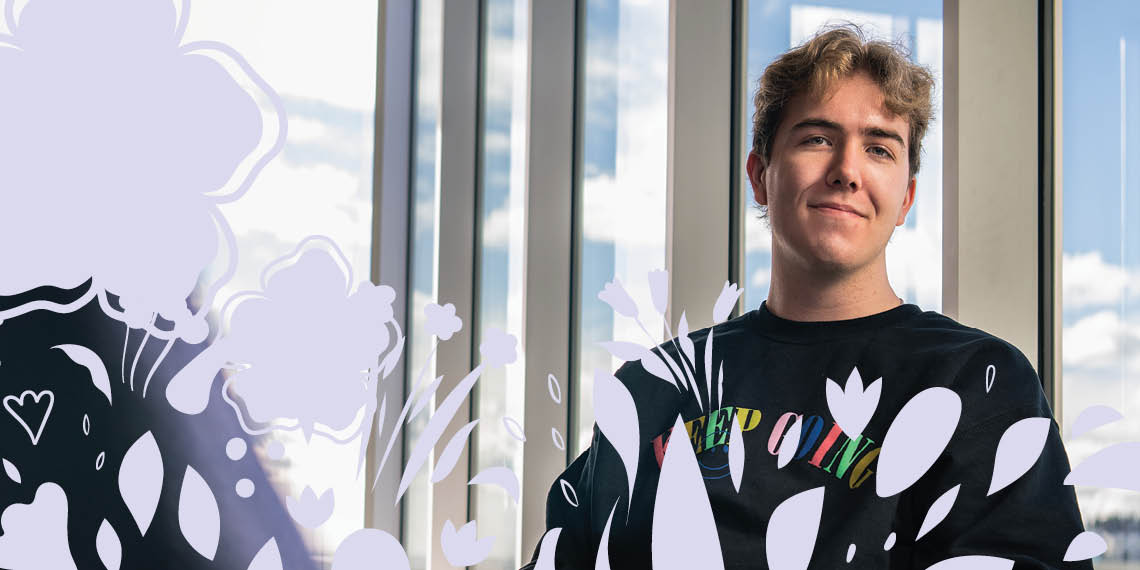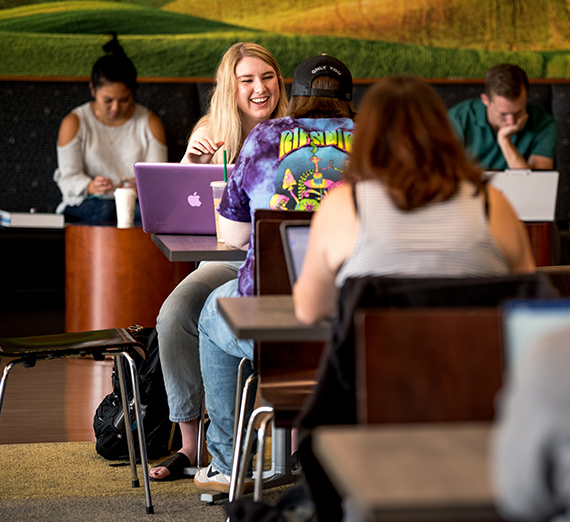Blooming Where They Are Planted

As a first-year student, Grant Hagen ('24) dealt with debilitating anxiety. After starting therapy, he shared his experience with others to create a conversation about mental health and encourage others to do the same.
While completing his psychology degree, Hagen turned his anxiety-calming mantra “keep going” into a campaign aimed at destigmatizing mental health.
“He could easily have recovered and quietly moved on with college life,” says his mother, Sarah. “But instead, he made a conscious decision to tell his story and keep the conversation going so others who might be suffering know they are not alone.”
Hagen’s passion is timely, as conversations about mental health are needed more than ever.
A Healthy Minds survey of 96,000 U.S. college students from the 2021-22 academic year found the highest rates of mental health concern in the 15-year history of the survey. Forty-four, 37 and 15 percent of students reported symptoms of depression, anxiety and suicide consideration respectively.
Jennifer Fountain, Gonzaga’s dean of Student Well-being and Flourishing, sees connections between the current cultural climate and mental health.
“We can draw lines back to COVID-19, back to the pressures of the economy and the instability of the world,” she says. “During the pandemic, anxiety and depression increased 25%; other factors such as racial injustice, economic disparities, and geopolitical conflict requires our mental health to be a priority.”
How does a student at Gonzaga counter those and maintain good health?
People thrive when they can safely and bravely live their authentic selves, Fountain says.
So, one way the University supports wellness is by encouraging students to place themselves in environments “where they don’t have to code switch, where they don’t have to temper a piece of themselves,” she says. That means having a holistic approach to the academic experience and the student life environment on campus.
AN INTEGRATED APPROACH
Student Well-being and Flourishing includes the Center for Cura Personalis, Health & Counseling Services, Office of Health Promotion, and operates closely with other Student Affairs areas such as conflict resolution, academic advising, learning strategies, disability access, and inclusion and belonging.
GU follows the eight dimensions of wellness defined by the Substance Abuse and Mental Health Services Administration: emotional, spiritual, intellectual, physical, environmental, financial, occupational and social.
“We educate and support the whole student – and this is a complement to a student's scholarship,” Fountain says.
ZAGS360
Within athletics, Gonzaga has streamlined wellness services into a new format – Zags360 – which takes a similar eight- dimension approach targeting academic, physical, social, spiritual, community, career, financial and mental sectors for athletes.
The Athletics Department also offers the Extra Mile Institute (EMI) a mental performance and well-being program that helps athletes bolster their mental strength. With the hiring of a licensed psychologist and director of student-athlete mental health services, Trisha Nash, student athletes also benefit from better access to mental health resources.'
ONE FAMILY’S TESTIMONY
Last year, the parents of a current student generously donated $10,000 to the University after their son received quality care from administration and staff during his time at Gonzaga.
They say staff’s “unwavering dedication to understanding and enhancing” their son’s experience “speaks volumes about Gonzaga’s ethos of personalized attention and student-centeredness.”
“It’s evident that beyond staff’s professional roles, they embody the spirit of companionship and genuine interest in each student’s journey,” the parents say.
That experience embodies the goals of Student Affairs organization and operation, Fountain says.
Providing a community of care is a focal point for Gonzaga, particularly to strengthen the partnership between academic and student life to ensure that all faculty are prepared to respond to and know where to direct students in cases of crisis.
“The programming we do, the people we recruit and hire, the professional development and training we engage in are all coming back to that topic of wellbeing and wellness,” Fountain says.
GENEROSITY IN ACTION
“A thriving student is someone who is physically and mentally healthy, whatever that looks like for the individual because it’s going to be different from person to person,” says Holly Jones ('22 M.A.), doctoral student and senior development strategist and writer who is part of the University Advancement team raising funds to support students, programs and resources.
Thanks to the deep generosity of Don Pearson (’66†), Gonzaga intends to increase student wellness support. While his multimillion-dollar gift was unrestricted, the University chose to put a portion of his donation toward student flourishing initiatives as a tribute to Pearson’s commitment to social work and care for youth.
“He really cared deeply about making sure that people have the resources they need to really thrive, especially kids,” says Jones.
Pearson’s gift will fund crucial training in areas of de-escalation and trauma-informed practices for faculty and staff, as well as resources for communicating about available resources with students.
“Graduating at the top of your class or getting the job that makes the most money – that's not the top priority. The top priority is making sure that you have an experience that is the healthiest possible and helps you become the best you that you can be,” Jones says.
Because that is when one truly flourishes.
REFLECTION AS A TOOL FOR WELL-BEING
Gonzaga has named the reflection room in the John J. Hemmingson Center in honor of Alma and Reinhold Pearson, parents of Don Pearson (’66), whose generous bequest will benefit students for years to come. The reflection room provides a quiet space for students, faculty and staff to practice mindfulness, reflection and prayer. athletics, Gonzaga has streamlined wellness services into a new format – Zags360 – which takes a similar eight- dimension approach targeting academic, physical, social, spiritual, community, career, financial and mental sectors for athletes.
- Student Life
- Health & Wellness
- College of Arts & Sciences
- Psychology
- Gonzaga Magazine





